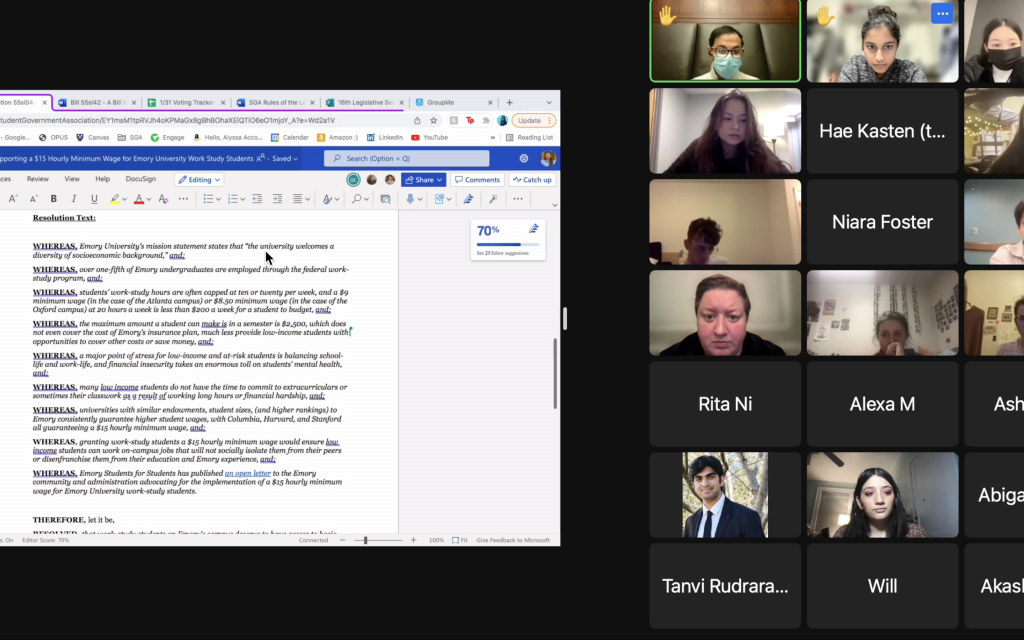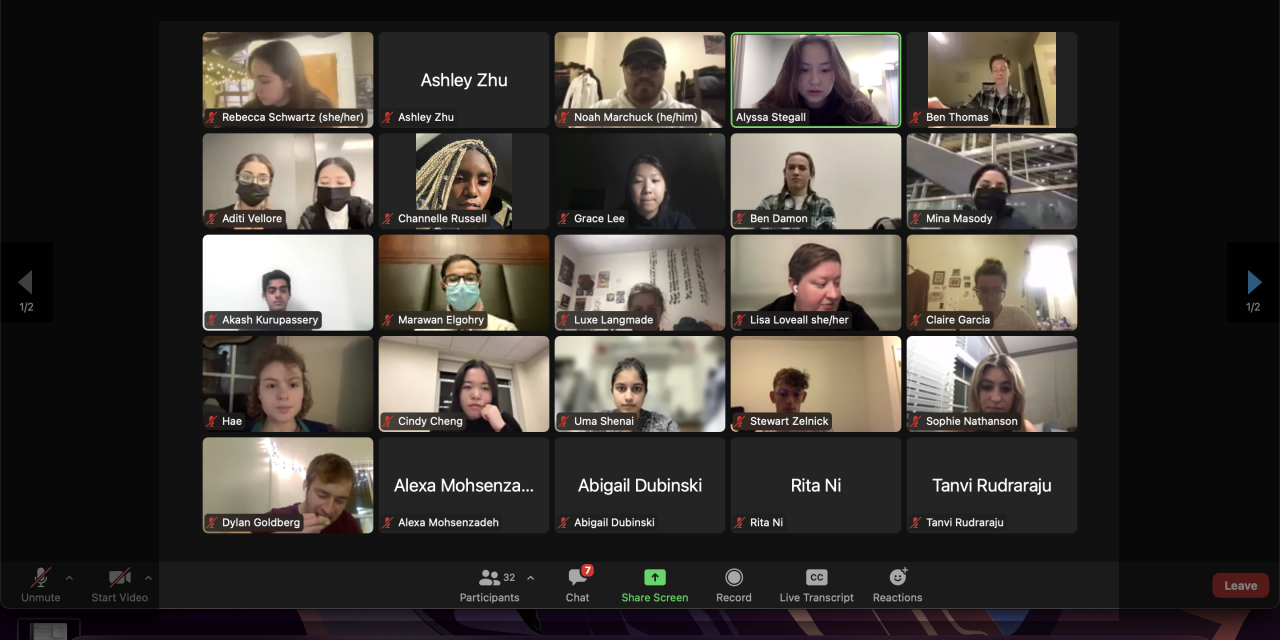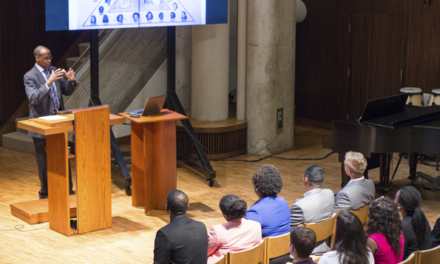The Student Government Association (SGA) passed a resolution on Jan 31 with unanimous consent in favor of supporting an increased minimum wage for students, with an amendment that stated the current Federal Work-Study structure would remain unchanged.
Founder of Emory Students for Students Elisabet Ortiz (24C) appealed to SGA for support of an open letter addressed to Emory University advocating for a $15 minimum wage for all student workers on campus.
Ortiz originally founded Students for Students as a fund to provide immediate needs for students, but it has since evolved into an advocacy organization for low-income students.
“The reason we’re advocating for a $15 minimum wage is because it affects so many intersections,” Ortiz said. “For me, it would have meant stability and helping with health care costs. When we talk about helping low-income and minority students, we have to talk about the tangible resources that we can provide.”
Over 20% of the student body is comprised of undergraduate workers, according to Ortiz, so having SGA’s approval on the open letter would have a far-reaching impact on student life.
“The resources and platform SGA has would be invaluable to our mission,” Ortiz added. “At the end of the day, the student government exists to represent the needs of students and to be a direct line between the student body and Emory administration.”
Ortiz emphasized that she is advocating for campus student workers in general, regardless of whether or not they participate in work-study. There is currently a $2,500 limit on earnings for work-study students.
“It would be up to the provost to raise the budget for increased wages in different departments,” Ortiz said.
Students for Students has had conversations with various administrators, including the faculty senate president, all of whom have been open to an increase in minimum wage, Ortiz said.
“We think it’s effective to make it in the format of an open letter so the University has more accountability,” Ortiz said. “A big part of our mission is actually changing policies of the University — something really transparent so that students can get involved at a grassroots level — so this is going to be a step in doing that.”

At the SGA meeting on Jan. 31, SGA unanimously passed a resolution from Emory Students for Students in support of raising the University minimum wage to $15/hour. (Ashley Zhu)
The University has been aware of the wage issue for almost a year, and they have seen little to no change, Claire Garcia (22C) stated.
“There’s already been so much inaction,” Garcia said. “The reason why this letter is happening is because we need to take a stronger stance. Maybe this feels fast, but it’s really not — it’s been going on for a long time.”
Additionally, the resolution proposed by the Emory Climate Coalition last week was revised to remove controversial language concerning the endowment, which aimed to direct the entirety of the multibillion dollar amount into environmental funds, and passed with unanimous consent.
“I think this is a great first step in moving towards more sustainability initiatives, and I’m excited to support it,” Rebecca Schwartz (24C) said.
Proposed bill would mandate the election of the SPC president
An open forum discussion regarding a bill to mandate the election of the Student Programming Council (SPC) president was tabled to next week’s SGA meeting, due to time constraints. However, College Council President Akash Kurupassery (22C) emphasized the importance of implementing a “much-needed change” to ensure that SPC leadership is “held directly accountable to the students of Emory.”
According to a Jan. 30 email from Kurupassery, he explained that holding SPC elections rather than internal appointments would also allow for increased diversity and student trust in the organization.
“Currently, SPC has $462,700, and there is no student accountability in terms of their operations,” Kurupassery said. “SGA doesn’t regulate them at all, and they’re currently functioning autonomously.”
Kurupassery is also motivated to pass the bill to enhance Oxford representation and inclusivity.
For the SPC Homecoming concert, he explained that SPC had more than enough funds to rent shuttles to transport Oxford students to the Atlanta campus. However, Oxford students were instead required to pay for transportation themselves.
“Elections are important because Oxford students can hold SPC accountable when they vote,” Kurupassery said. “They can ask, ‘How are you serving me? Why should I vote for you as a candidate?’”
The proposition is not new. SPC was required to elect their president and vice president in the past, and it was a “hard fought battle” to make the change to internal appointment, Kurupassery said.
Kurupassery said that any anticipated backlash to the bill would come from SPC.
Current SPC President Thomas Heagy (22B) stated in an email that “without consulting the President or Vice President of the Student Programming Council for feedback, the authors [of the bill] only target SPC with this duplicitous attempt to improve transparency among executive agencies.”
According to Heagy, the bill’s attempt to use the Oxford concert shuttles as justification is “disingenuous,” because he personally worked with both staff and Oxford student leaders to ensure extra shuttles were available before and after the concert.
“The authors lean on the idea of an SPC leader from seven years ago that ‘it [is] proper for the SPC president to be chosen via a University-wide election, since SPC makes use of the student body’s money,’” Heagy wrote. “This notion unintentionally implies that no hard-working student leader can be entrusted to make fiscal decisions without a school wide vote.”
Heagy said that, while he agrees that SPC must play a greater role to build community at Emory, they have listened to the needs of the students through surveys and feedback forms, which influence their decisions both on regularly scheduled programming and larger events such as artist selection and the concert experience.
“SPC thinks that their procedures are working,” Kurupassery said. “But students as a whole want to have control over their student activities. The more students find out about it, the more support I’ll get.”
Ashley Zhu (she/her) (25C) is from Dallas, Texas, majoring in biology and minoring in sociology. She is the vice president of recruitment for the Residence Hall Association, a sophomore advisor for Raoul Hall and a staff writer for the Emory Undergraduate Medical Review. She is involved in cell biology research at the Pallas Lab and is a BIOL 141 Learning Assistant. Zhu enjoys FaceTiming her dog, stalking people's Spotify playlists and listening to classical music in her free time.






